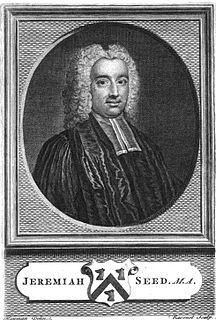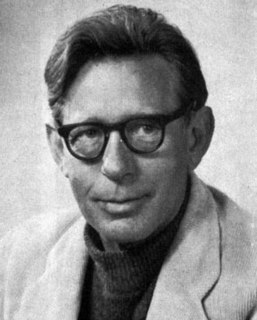A Quote by Joshua Reynolds
But young men have not only this frivolous ambition of being thought masters of execution, inciting them on the one hand, but also their natural sloth tempting them on the other. They are terrified at the prospect before them, of the toil required to attain exactness. The impetuosity of youth is disgusted at the slow approaches of a regular siege, and desires, from mere impatience of labour, to take the citadel by storm. They wish to find some shorter path to excellence, and hope to obtain the reward of eminence by other means, than those which the indispensable rules of art have prescribed.
Quote Topics
Also
Ambition
Approaches
Art
Attain
Before
Being
Citadel
Desires
Disgusted
Eminence
Exactness
Excellence
Execution
Find
Frivolous
Hand
Hope
Impatience
Indispensable
Labour
Masters
Means
Men
Mere
Natural
Obtain
Only
Other
Path
Prospect
Regular
Required
Reward
Rules
Siege
Sloth
Slow
Some
Storm
Take
Tempting
Terrified
Than
Them
Those
Thought
Toil
Which
Wish
Young
Young Men
Youth
Related Quotes
What is it, in your opinion, to be a great nobleman? It is to be master of several objects that men covet, and thus to be able to satisfy the wants and the desires of many. It is these
wants and these desires that attract them towards you, and that make them submit to you: were it not for these, they would not even look at you; but they hope, by these services... to obtain
from you some part of the good which they desire, and of which they see that you have the disposal.
Men of superior vivacity and wit, when they take a wrong turn, are generally worse than other men: because wit, consisting in a lively representation of ideas assembled together, gives every sensible object those heightening touches, and that striking imagery, which is unknown to men of slower apprehensions: wit being to sensible objects, what light is to bodies; it does not merely show them as they are in themselves: it gives an adventitious colour, which is not a property inherent in them: it lends them beauties which are not their own.
By integrating women into particularly military institutes, it cripples the readiness of our defense. Schools like The Citadel train young men to confidently lead other young men into a battlefield where one of them will die. And when you have women in that situation, it creates a whole new set of dynamics which are distracting to training these men to kill or be killed.
My belief is that we were put into this world of wonders and beauty with a special ability to appreciate them, in some cases to have the fun of taking a hand in developing them, and also in being able to help other people instead of overreaching them and, through it all, to enjoy life - that is, to be happy.
Many are the noble words in which poets speak concerning the actions of men; but like yourself when speaking about Homer, they do not speak of them by any rules of art: they are simply inspired to utter that to which the Muse impels them, and that only; and when inspired, one of them will make dithyrambs, another hymns of praise, another choral strains, another epic or iambic verses- and he who is good at one is not good any other kind of verse: for not by art does the poet sing, but by power divine.
From the earliest times man has been engaged in a search for general rules whereby to turn the order of natural phenomena to his own advantage, and in the long search he has scraped together a great hoard of such maxims, some of them golden and some of them mere dross. The true or golden rules constitute the body of applied science which we call the arts; the false are magic.
Those who profess contempt for men, and put them on a level with beasts, yet wish to be admired and believed by men, and contradict themselves by their own feelings--their nature, which is stronger than all, convincing them of the greatness of man more forcibly than reason convinces them of his baseness.
There are three distinct kind of judges upon all new authors or productions; the first are those who know no rules, but pronounce entirely from their natural taste and feelings; the second are those who know and judge by rules; and the third are those who know, but are above the rules. These last are those you should wish to satisfy. Next to them rate the natural judges; but ever despise those opinions that are formed by the rules.
The prospect Smiler was a manic farmer. Few men I think can have been as unfortunate as he; for on the one hand he was a melancholic with a loathing for mankind, on the other, some paralysis had twisted his mouth into a permanent and radiant smile. So everyone he met, being warmed by his smile, would shout him a happy greeting. And beaming upon them with his sunny face he would curse them all to hell.
My experiences of men has neither disposed me to think worse of them nor be indisposed to serve them: nor, in spite of failures which I lament, of errors which I now see and acknowledge, or the present aspect of affairs, do I despair of the future. The truth is this: The march of Providence is so slow and our desires so impatient; the work of progress so immense and our means of aiding it so feeble; the life of humanity is so long, that of the individual so brief, that we often see only the ebb of the advancing wave and are thus discouraged. It is history that teaches us to hope.
A prince ought to have no other aim or thought, nor select anything else for his study, than war and its rules and discipline; for this is the sole art that belongs to him who rules, and it is of such force that it not only upholds those who are born princes, but it often enables men to rise from a private station to that rank. And, on the contrary, it is seen that when princes have thought more of ease than of arms they have lost their states. And the first cause of your losing it is to neglect this art; and what enables you to acquire a state is to be master of the art.







































